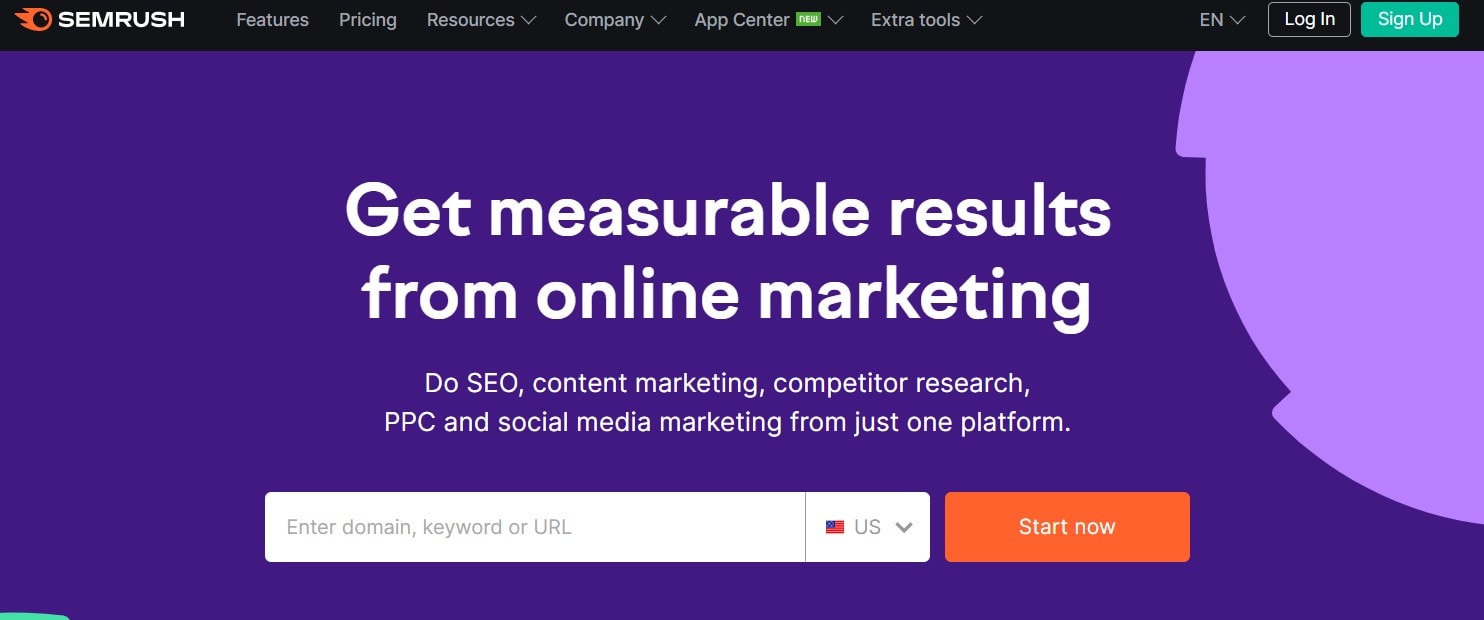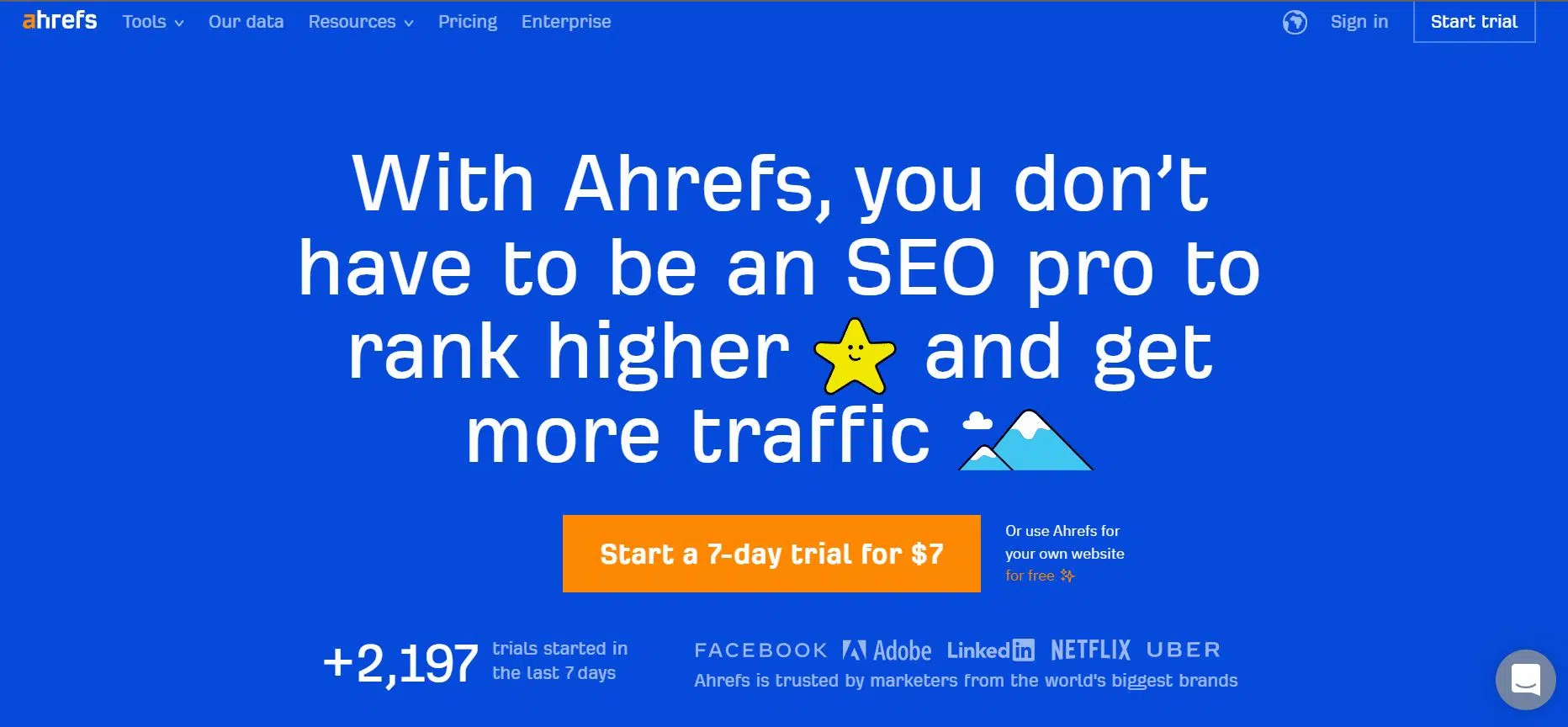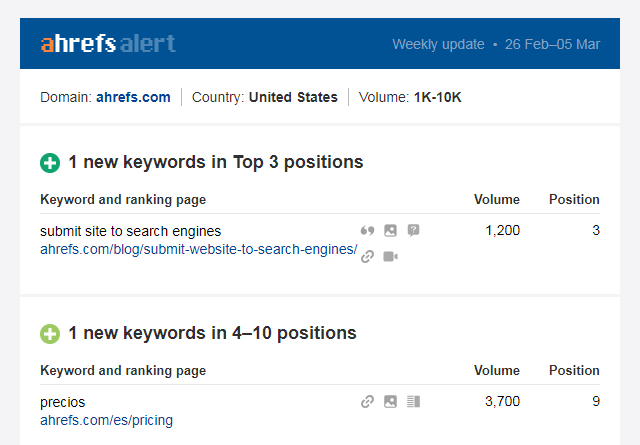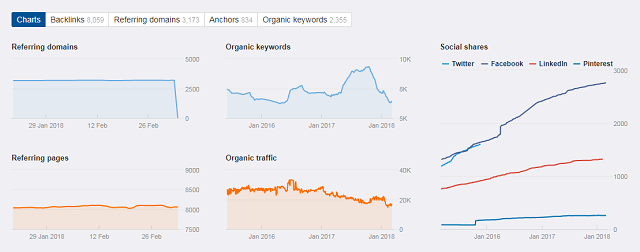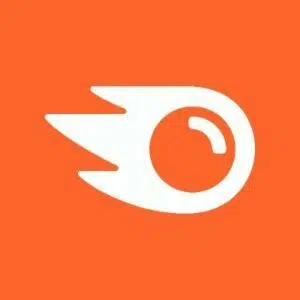
SemrushLearn More |
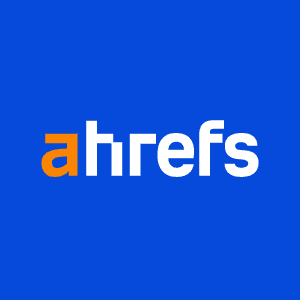
AhrefsLearn More |
|---|---|
| $ Pricing | $119.95 – $449.95 / mo. | $99 – $999 / mo. |
| Best for |
Semrush started with just two tools in 2008 when it launched its business. Its original focus was on providing a broad keyword database for its users. |
Ahrefs is a software development company specializing in SEO tools and free resources to educate marketing professionals. |
| Features |
|
|
| Pros | |
|
|
| Cons | |
|
|
| Ease of Use | |
|
The tools of Semrush are really easy to use and the response time is very less. super easy to use |
easy to use |
| Value For Money | |
|
The subscriptions are affordable for the number of tools offered to users. |
The subscriptions are a bit pricey and don’t offer as many options for users. |
| Customer Support | |
|
Typically replies within one business day via email or within minutes via live chat. Also offers a broad range of knowledge-based articles, blogs, and academy training for users. |
Offers a forum where you can ask for advice from the Ahrefs team, but has no option to speak with a representative for more advanced support. They do offer an academy. |
Picking the right SEO tool can make or break your digital marketing strategy. With so many features, metrics, and bold claims to sort through, the decision often comes down to two heavyweights: Semrush Vs Ahrefs.
These tools are favorites among marketers, businesses, and agencies worldwide—and for good reason. They’re powerful.
But which one is right for you?
Are you looking to level up your keyword research, get better at managing backlinks, or fine-tune your technical SEO? To make the right call, you’ll need to understand how these two stack up.
In this guide, we’ll explore the strengths, features, and shortcomings of each platform. By the time you’re done reading, you’ll have a clear picture of which tool deserves a spot in your marketing arsenal.
Let’s jump in and see if Semrush or Ahrefs is the perfect match for your strategy.
Semrush vs Ahrefs: Which One Is Better?
While millions of users highly trust both, it depends on what your needs are.
Both Ahrefs and Semrush offer tools that function in similar ways. However, Ahrefs doesn’t match the number of options available from Semrush, which boasts 55+ tools.
After looking at the table above and the features comparisons below, it’s obvious that Semrush is the platform of choice.
So, we’ve outlined the major differences for you and why we believe you should choose Semrush—the best SEO tool for your marketing needs.
Semrush Overview
Want to know more about Semrush Check Out Our Detailed SEMrush Review: Why Semrush Is The Best?
Ahrefs Overview
Semrush vs. Ahrefs: Features Comparisons
We won’t be able to list every tool available between the two platforms, so we selected the most popular from each company to talk about their differences.
Keep in mind that Semrush offers several functions that Ahrefs doesn’t, so many additional tools from Semrush are not detailed here.
1. Domain Analytics
Semrush
Semrush has three tools available to monitor domain analytics: the Domain Overview, Organic Research, and Keyword Gap tools. Domain Overview and Organic Research allow you a quick overview of paid and organic data for any URL, subdomain, or subfolder. The Keyword Gap tool shows areas where you or your competitors aren’t currently targeting keywords.
In the Domain Overview, users with any subscription are able to view their top 100 keywords. One of the biggest differences between Semrush and Ahrefs in the domain analytics tools is the number of requests available.
Semrush allows 3,000 to 10,000 per day, depending on which subscription a user has. Users with a Guru subscription or higher also have full access to historical data.
Ahrefs
Ahrefs, on the other hand, offers only one domain analytics tool: Site Explorer.
It also only shows the top 100 keywords for users with higher-level subscriptions. In addition, request limits per day are far lower, starting at 25 for Lite users and going up to only 1,000 for Agency subscribers. Site Explorer only shows Standard users and above historical data, and only Enterprise users are allowed full access to the data.
2. Keyword Tools
Semrush
When you think about ranking on search engines, you probably think of Google. Semrush offers the largest Google search engine database out there. It also offers a language filter in its Keyword Magic tool and gives insights into the searcher intent.
Ahrefs
Ahrefs doesn’t just offer keyword ideas for Google; it also provides keyword ideas for nine other search engines:
- YouTube
- Amazon
- Bing
- Yahoo
- Yandex
- Baidu
- Daum
- Naver
- Seznam
Since not everyone in the world uses Google (although a majority do), this is an advantage for users who want to capture queries on other search engines.
3. Backlinks Analytics
Semrush
One of Semrush’s biggest wins in backlinks analytics is its ability to connect with Google tools. Semrush also has the fullest and fastest backlink index on the market, a claim backed up by data. Currently, it has over 43 trillion backlinks in its database, making it the fastest and largest on the market.
Ahrefs
Ahrefs used to boast the largest backlinks database on the web—a title Semrush can now claim. Currently, Ahrefs has over 25 million backlinks in its database. Ahrefs has several backlink indexes from which it pulls data, and it provides a lot of competing tools and functions of backlink analytics. However, it still has quite a few limitations when it comes to assessing toxic scores and accessing a full database of backlinks.
4. Rank Tracking
Semrush
Semrush and Ahrefs have matched each other in terms of how many keywords you can track per subscription. The major difference with rank tracking here is that Semrush updates its rankings every day.
Semrush also provides unique position tracking data when it comes to:
- Local volume
- Advanced reports for cannibalization and featured snippets
- Customizable alerting system
- Mobile app position tracking
- Devices and locations reports
Ahrefs
For Ahrefs, you’ll have to upgrade your account to update your data daily. Otherwise, Ahrefs offers limited rank tracking updates. One upside to Ahrefs, however, is it allows an unlimited number of locations to track if the user has an Advanced subscription.
5. Site Audit
Semrush
Semrush runs 140+ site audits and can scan up to 100,000 pages, depending on the website. More great things about its Site Audit tool are the advanced checks for AMP pages, comprehensive site health, advanced checks for HTTPs usage, and advanced reporting. Additional reports on crawlability, international SEO, site performance, and internal linking are also available.
The Site Audit tool can integrate with Google Analytics, Trello, and Zapier as well. As far as where the Core Web Vital data pulls reports from, users get that data from Lighthouse.
Ahrefs
While it provides just over 100 site audits, one of the upsides to Ahrefs’ Site Audit tool is that users can crawl up to 2.5 million pages max. And when generating a Core Web Vitals report, it pulls data directly from PageSpeed Insights.
JavaScript rendering is available for all subscription levels, and the Site Audit tool also checks for external link issues. Ahrefs doesn’t do advanced checks on AMP pages, and it only does basic checks like missing HTML lang tags and missing hreflang tags.
6. Content Tools
Semrush
Semrush’s comprehensive 5-tool Content Marketing Platform helps users improve, optimize, analyze, and centralize their content. Users get these tools:
- SEO Content Template
- SEO Writing Assistant
- Topic Research
- Post Tracking
- Content Audit
With these, you can create content briefs, optimize the content on the go, monitor content performance, and research new ideas. In addition, the SEO Writing Assistant provides a WordPress and Google Docs add-on when writing and optimizing content.
Content Marketplace is great for those who are short on time and can’t produce their content. You can order content directly from a vendor!
Ahrefs
Currently, Ahrefs offers only Content Explorer, with no additional features that would help users create better content. Content Explorer only displays popular topics on a national level. However, Ahrefs does provide a WordPress SEO add-on that helps users identify pages with low or high performance.
8. Advertising Research Tools
Semrush
If you’re trying to up your advertising game, Semrush has a toolkit to get that ball rolling. Its dedicated tools include:
- PLA Research
- PPC Keyword tool
- Display Advertising
- Ads History
Together, these tools let you track PPC keywords, an ad’s history, competitor ads, the top subdomains, and position changes.
Ahrefs
When it comes to advertising research with Ahrefs, you can run several reports through Site Explorer. You can do advertising research for PPC keywords, ad history, ad examples, and top landing pages.
Pricing Overview of Semrush Vs Ahrefs
Semrush Pricing
Semrush has three main pricing tiers—Pro, Guru, and Business—designed to cater to everyone from solo marketers to large enterprises. Let’s break them down so you can figure out which one fits your needs (and budget).
1. Pro Plan – $139.95/month
Perfect for small teams or individuals just starting. This plan gives you the basics:
- 5 projects to manage.
- Ability to track 500 keywords (rank tracking).
- 10,000 results per report to dig into your data.
- Essential tools for SEO, PPC, and competitive research, like website audits and backlink analysis.
If you’re looking for a no-frills option with solid SEO tools, this is a good place to start.
2. Guru Plan – $249.95/month
The Guru plan is ideal for agencies and mid-sized businesses. Here’s what you get:
- 15 projects (triple what you get in Pro).
- Track up to 1,500 keywords—great for scaling campaigns.
- 30,000 results per report, so you can analyze larger datasets.
- Advanced features:
- Tools for content marketing strategies.
- Access to historical data to see trends over time.
- Integration with Looker Studio (formerly Google Data Studio) for custom reporting.
This plan balances price and performance, making it a favorite for growing businesses.
3. Business Plan – $499.95/month
This plan is built for large agencies and enterprises with high-volume needs. Here’s what’s included:
- Manage up to 40 projects (that’s 8x more than the Pro plan).
- Track an impressive 5,000 keywords for bigger campaigns.
- 50,000 results per report, so no data gets left behind.
- Advanced tools and extras like:
- Share of Voice metrics to understand your visibility.
- API access for custom integrations.
- Increased limits across the board for more flexibility.
If you’re managing multiple clients or handling complex campaigns, this plan has you covered.
Add-Ons for Extra Firepower
Need even more? Semrush offers add-ons you can purchase separately:
- Semrush Local: Optimize for local SEO.
- Trends: Get deep insights into market and industry trends.
- Social Media Management: Manage and track your social media campaigns.
- Agency Growth Kits: Tools specifically designed to help agencies grow their client base.
Ahrefs Pricing
Ahrefs offers four main pricing plans: Lite, Standard, Advanced, and Enterprise, with a range of features tailored to different needs.
1. Lite Plan: Starting at $129 per month, this plan is suited for small businesses and hobby projects. It includes 5 projects, 6 months of history, and 500 credits per user. It allows tracking 750 keywords and includes essential tools like Site Explorer, Keywords Explorer, Site Audit, and Rank Tracker.
2. Standard Plan: Priced at $249 per month, this plan is ideal for freelance SEO and marketing consultants. It includes 20 projects, 2 years of history, and unlimited credits. You can track up to 2,000 keywords and access additional features like Looker Studio integration and more detailed site analysis.
3. Advanced Plan: Starting at $449 per month, this plan is designed for lean in-house marketing teams. It offers 50 projects, 5 years of history, and 5,000 tracked keywords. Advanced features include API access, AI Content Grader, and enhanced site audit and ranking capabilities.
4. Enterprise Plan: This custom-priced plan is tailored for agencies and enterprises. It includes 100 projects, unlimited history, and 10,000 tracked keywords. It also offers unlimited users, advanced access management, and additional capabilities like audit logs and SSO.
Add-Ons
Ahrefs also offers optional add-ons like the Content Kit and Report Builder, starting at $99 per month, as well as advanced project options like Project Boost Pro and Project Boost Max, which add extra features for a cost of $20 or $200 per project per month.
| Semrush | Ahrefs | |
| Pricing | $139.95/mo – $449.95 / mo. | $129/mo – $1499 / mo. |
| Features | Domain Analysis, Keyword Research, On-Page SEO, Competitor Analysis, Content Marketing, Local SEO, Link Building, Social Media Management, Paid Advertising, Rank Tracking | Site Explorer, Keyword Explorer, Site Audit, Rank Tracker, Content Explorer |
| Keyword Database | 22 billion+ keywords | 17.3 billion+ keywords |
| Backlink Database | 43 trillion+ backlinks | 27 trillion+ backlinks |
| API | API covers organic traffic analysis, backlink data, keyword research, data from Position Tracking, and Site Audit
2 types of API packages:
|
API covers backlink data only
3 types of API plans:
|
| Projects |
|
|
| User Management |
Additional users:
|
Additional users:
|
| Value for Money | ★★★★★
The subscriptions are affordable for the number of tools offered to users. |
★★★★☆
The subscriptions are a bit pricey and don’t offer as many options for users. |
| Customer Support | ★★★★★
Typically replies within one business day via email or within minutes via live chat. Also offers a broad range of knowledge-based articles, blogs, and academy training for users. |
★★★☆☆
Offers a forum where you can ask for advice from the Ahrefs team, but has no option to speak with a representative for more advanced support. They do offer an academy. |
Semrush vs Ahrefs: Pros and Cons
Semrush
Pros:
- Packed with comprehensive keyword research tools to uncover new opportunities.
- It’s an all-in-one digital marketing platform—great for managing SEO, PPC, social media, and more.
- Offers strong competitor analysis to keep an eye on rivals’ strategies.
- Includes detailed site audit tools to identify and fix SEO issues.
Cons:
- The interface can feel overwhelming for beginners—lots of features, lots of menus.
- Pricing climbs quickly if you need advanced features or larger data limits.
- Some users have noted occasional data accuracy issues, especially with search volumes.
Ahrefs
Pros:
- Delivers top-tier backlink analysis—it’s their bread and butter.
- Offers a huge and frequently updated backlink database.
- The interface is simple and intuitive, making it beginner-friendly.
- It also includes a powerful keyword research tool with reliable data.
Cons:
- It falls short on on-page SEO features, so it’s less helpful for content optimization.
- Unlike Semrush, it lacks broader marketing tools beyond SEO.
- Pricing can be steep, especially for smaller businesses or freelancers.
Quick Links:
- SEMrush Academy SEO Course Review
- SimilarWeb Vs Ahrefs; Which Web Tracking Tool Is Best For You?
- 14 Best WordPress SEO Tools; Plugins 2024 With Reviews [Latest]
- 10 Best Website SEO Audit Tools 2024: Find My #1 Pick 🚀
Conclusion: Semrush vs Ahrefs | Who Is the Winner?
Even without a grand side-by-side comparison, it’s clear Semrush is the better choice—not only because of the wealth of tools included in a Semrush subscription but also because access to all of those tools is incredibly cost-effective.
Semrush is also a clear leader in backlinks and keyword databases, meaning you’re going to have access to more data and more marketing possibilities.
Having over 55 tools in one place also saves you from needing to use similar tools across various platforms and keeps your marketing costs down.
Semrush also provides a great deal of customer support, educational training, blog resources, and knowledge-based articles to give users the confidence they need to market responsibly and effectively.
As for Ahrefs, it’s currently missing a lot of capabilities that agencies, marketing specialists, and small business owners could find value in. Ahrefs costs are rather high given what they don’t include, making them a less economical choice—especially for smaller agencies or business owners who don’t have a large budget.
Still not convinced? Try Semrush for free with my 30-day free trial!
Also read:

